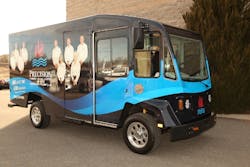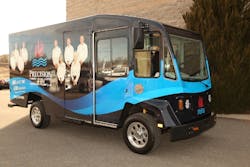An all-electric vehicle for Precision Plumbing, Heating, Cooling, Electric
Since joining the staff of Contractor magazine, I have become the magazine’s automotive correspondent. It’s rather ironic since I grew up in the Metro-Detroit area, but never worked in the automotive industry or had much of anything to do with the automotive industry until moving to Chicago for an associate editor position with Contractor magazine. That’s when I started writing articles about vehicles for the contractor community.
From talking to different contractors, it seems many are purchasing fuel-efficient vehicles to cut costs at the pump, and some contractors take it a step further, such as Precision Plumbing, Heating, Cooling and Electric, which has served the Boulder and Denver regions. This January the company unveiled an electric truck service technicians will drive. Precision is Boulder Electric Vehicle’s first customer, and Tom Robichaud, Precision owner and president, has committed to purchasing 20 vehicles for his fleet at a cost of $1.4 million.
“This is the future and everyone needs to do their part with energy conservation,” said Robichaud. “There is no reason why a plumber can’t lead the way and set the example. The electric motor is two to five times more efficient than a diesel engine. Higher efficiency means less energy consumption. Less energy consumption means lower costs and less pollution.”
Carter Brown, CEO of Boulder Electric Vehicle and a Precision customer, invented the electric service truck, and convinced Robichaud to test-drive the truck that he felt would be a perfect fit for the service industry because of the short routes service technicians drive daily.
After meeting with Brown a multitude of times, Robichaud was sold on the benefit to the environment, his business and the community. Robichaud also hired Bella Energy of Louisville, Colo., to install solar panels on Precision headquarters to help recharge the batteries for eight hours at night after technicians drive them 120 miles during the day.
One neat thing about being the first company to purchase the trucks is that Robichaud is pretty much involved in any design changes that may be made to the vehicle.
“It is our intention to drive the first Electric Van for approximately 90 days and discover all of the nuances that might come with an EV or if there are any design changes we would like to have included with future vans,” said Robichaud. “It is then our intention to start the transition at two per month. Logistically it takes time to swap out a technician to a new van and we do not want to overwhelm ourselves, although the sooner we switch the sooner we start saving.”
What other contractor can say they were involved in the design process of an all-electric service vehicle? Not many! Robichaud is a great example of a contractor on the cutting-edge of technology. He serves as an example to others to take a risk and test new technologies. If the technology works, and in this case it seems that it does, it’s a win for everyone.
About the Author
Candace Roulo Blog
Senior Editor
Candace Roulo is a senior editor of Contractor magazine, based in Chicago.

